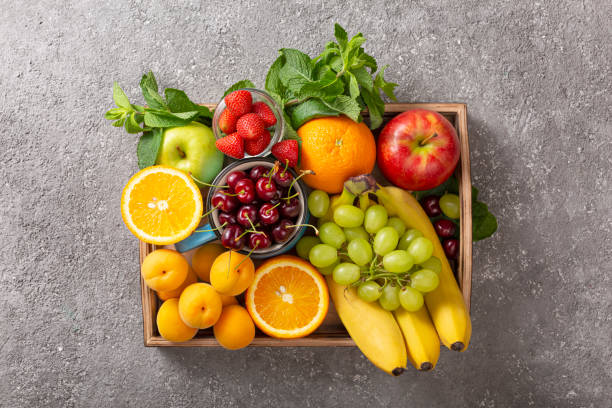The fruits are “juicy foods” comprising at least 75 % water. However, All that water helps the vitamins, minerals, antioxidants, and fiber.
It is high quality, nutritious carbohydrate that is an excellent source of antioxidants, vitamins, minerals, and fiber. The fiber in fruit is available in two forms — soluble and insoluble. It can be an enormous benefit when it comes to losing weight.
The soluble fibers in fruit can help stabilize blood sugar levels, keep you full and manage your appetite, and reduce cholesterol and blood pressure. Furthermore, it helps lower blood sugar levels by lowering the digestion of carbs into the bloodstream following meals. This could reduce the chance of developing type 2 diabetes and maintain constant energy and mood levels. Insoluble fiber can add bulk to your meals, so you can consume more without adding more calories.
It’s also possible to consider fruits as “juicy foods” since they mainly contain water. Fresh and frozen fruits and other food items with high levels of water are generally low in calories because the water in all of them adds volume and dilutes calories. The high water and fiber content in fresh fruit can fill you up at an affordable cost in calories, making fresh fruits a great option to add to your weight loss plan. The water content in fruit and drinking water helps to hydrate your cells, eliminates the body of toxins and aids in regular organ function, and aids in maintaining the optimal level of energy.
Fruits are particularly beneficial for thossufferinger from cardiovascular disease because research shows that diets rich in fruits and vegetables can lower the risk of having a heart attack, stroke, heart attack, and coronary arterial disease. Attention! Suppose you’re taking any medications for your heart (or any other medicines related to them). In that case, you must consult your doctor or pharmacist to determine whether any medications you take are incompatible with grapefruit. The compounds in grapefruit and grapefruit juice could influence how certain drugs are absorbed and processed, which is why you’ll want to stay clear of grapefruit, a healthcare expert advises.
Fruits are rich in common nutrients, including beta-carotene and beta-cryptoxanthin, as well as folate Vitamin B6, C, and E anthocyanins, potassium, and quercetin.
Beta-carotene is an antioxidant essential for the health of your skin. After eating fruits that contain beta-carotene, your body transforms some of the beta-carotene into vitamin A. As a result, this nutrient assists in developing and repairing skin tissue. It protects your skin from the sun’s UV rays and helps keep the hair healthy and strong. Vitamin A can also protect against macular degeneration. Another carotene in fruits, beta-cryptoxanthin, may reduce the likelihood of developing inflammatory diseases, including certain forms of arthritis.
B vitamins such as B6 and folate can aid the heart’s health, healthy hair, and improved memory. Folate is also involved in producing serotonin; consequently, it could assist in reducing depression and improving mood. Vitamin B6 also creates dopamine, which can help lower PMS symptoms.
Vitamin C is a potent antioxidant responsible for the overall health and well-being of collagen, a protein that assists in maintaining healthy cartilage and skin. Vitamin C is naturally found in the skin, and regularly consuming high-quality vitamin C-rich fruit can help replenish the complexion’s Vitamin C stores and improve your skin’s natural beauty. Vitamin C helps to improve joint flexibility, helps to promote healthful hair, and could reduce bone loss and decrease the chance of breaking. Vitamin C can also prevent macular degeneration and cataracts.
Vitamin E is a component of vitamin C to offer skin anti-aging protection. Vitamin E can help protect skin from sun damage and combat macular degeneration.
Fruits rich in potassium can aid in preventing osteoporosis by reducing the resorption of bone, which helps preserve bone density when you get older. The consumption of potassium-rich foods can assist in keeping blood pressure at a low.
They also contain many antioxidants, such as anthocyanin, potent compounds to fight disease. Thrives in purple, blue, and red fruits their colors, and quercetin is an antioxidant with anti-inflammatory properties. Recent research suggests that quercetin and anthocyanins can help reduce the process of aging-related memory loss and also protect from arthritis as well as other inflammation-related conditions.
In the case of fruit, however, there’s a crucial note: Fruit is more in sugar and calories than non-starchy veggies (nonstarchy vegetables include cauliflower, broccoli, bell peppers, mushrooms, etc. ). Therefore, you must be aware of your calories and not overeat fruits. You should aim for 2 to 4 portions of fresh fruit a day and reduce your consumption of high-calorie fruit juices.
Individuals with celiac disease must be aware that fresh fruits generally contain no gluten (making the fruit suitable for those on a celiac diet). Dates and figs can be sprayed using wheat flour to help them become less sticky and thus should be avoided. Read the label on each product carefully. Although the soluble fiber found in fruit can ease IBS symptoms, certain fruits can cause IBS discomfort. Furthermore, certain fruits can trigger migraines, such as citrus fruits and dried fruit with Sulfites as a preservative added to them.

